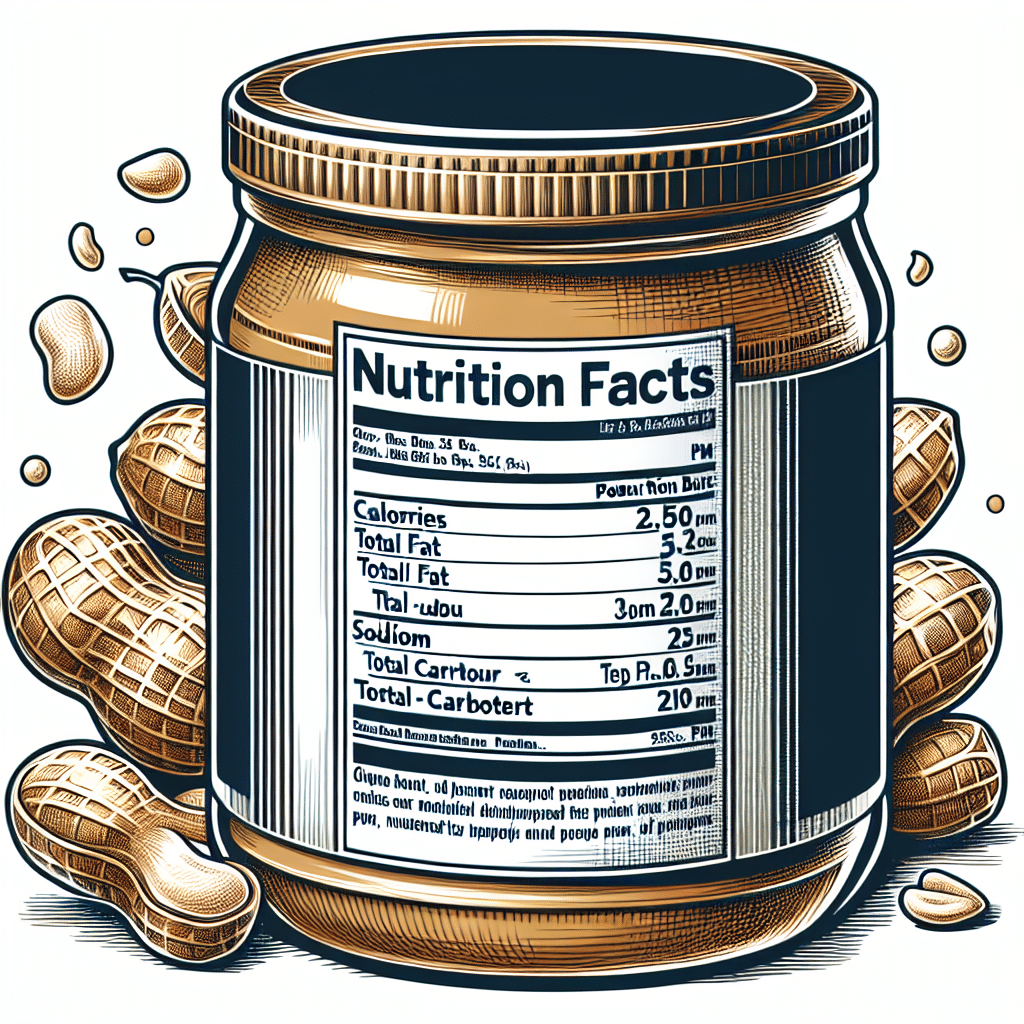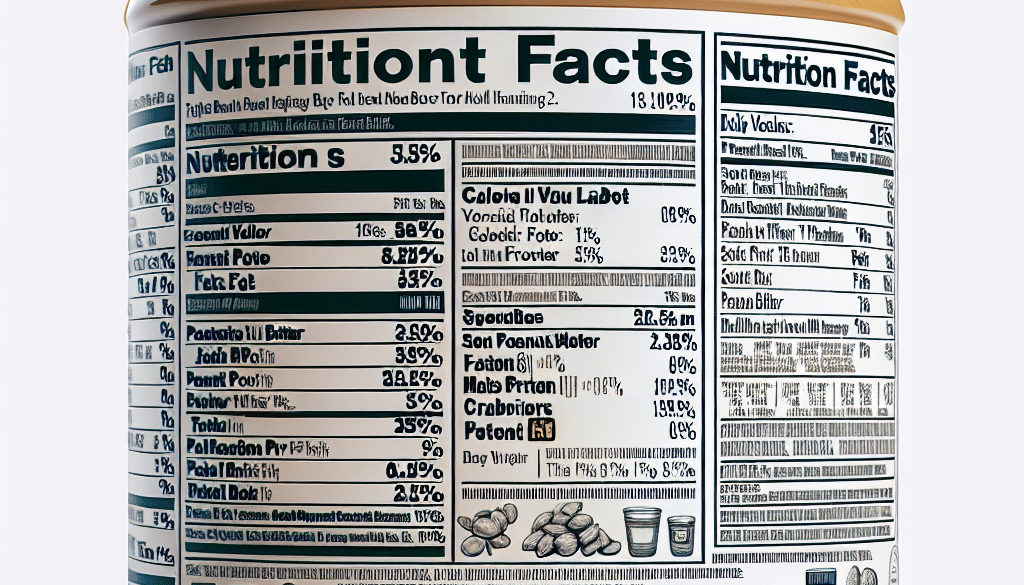Peanut Butter Nutrition Facts Label: Spreading the Nutritional Word
-
Table of Contents
- Peanut Butter Nutrition Facts Label: Unveiling the Nutritional Profile
- Understanding the Nutrition Facts Label
- The Nutritional Spread of Peanut Butter
- Case Studies: The Impact of Peanut Butter in Diets
- Choosing the Right Peanut Butter
- Conclusion: Spreading the Nutritional Word
- Discover ETprotein’s High-Quality Protein Products
Peanut Butter Nutrition Facts Label: Unveiling the Nutritional Profile

Peanut butter is a staple in many households, loved for its creamy texture and rich flavor. But beyond its taste, peanut butter is also valued for its nutritional benefits. Understanding the nutrition facts label on your jar of peanut butter can help you make informed dietary choices. This article delves into the nutritional word of peanut butter, spreading knowledge on what those labels really mean for your health.
Understanding the Nutrition Facts Label
Before we scoop into the jar, let’s first understand how to read the nutrition facts label found on peanut butter packaging. The label provides information on the following key components:
- Serving Size: Indicates the amount typically consumed in one sitting.
- Calories: Shows the energy provided by one serving.
- Total Fat: Includes saturated fat, trans fat, and unsaturated fats.
- Cholesterol: Peanut butter is naturally cholesterol-free.
- Sodium: Indicates the amount of salt in the product.
- Total Carbohydrates: Includes dietary fiber and sugars.
- Protein: Shows how much protein is in each serving.
- Vitamins and Minerals: Provides information on essential nutrients.
Now, let’s spread out the details and see what each of these components means for your health.
The Nutritional Spread of Peanut Butter
Peanut butter is more than just a delicious spread; it’s packed with nutrients that can contribute to a healthy diet. Here’s what you can typically expect from a standard serving of peanut butter:
- Calories: A two-tablespoon serving of peanut butter contains about 190 to 210 calories, making it a calorie-dense food that provides energy.
- Healthy Fats: Although high in fat, with 16 to 18 grams per serving, most of the fats in peanut butter are monounsaturated and polyunsaturated, which are beneficial for heart health.
- Protein: Peanut butter is a good source of plant-based protein, offering 7 to 8 grams per serving, which helps in muscle repair and growth.
- Dietary Fiber: With about 2 grams per serving, peanut butter can help with digestion and satiety.
- Vitamins and Minerals: It’s a source of essential nutrients like vitamin E, magnesium, potassium, and zinc.
- Low in Carbohydrates: With only 6 to 7 grams of carbohydrates per serving, peanut butter can fit into a low-carb diet.
However, not all peanut butters are created equal. The nutritional content can vary significantly between brands and types, such as natural or processed. It’s important to read labels carefully, especially when it comes to added sugars and sodium.
Case Studies: The Impact of Peanut Butter in Diets
Several studies have highlighted the benefits of including peanut butter in your diet. For instance, research has shown that consuming peanuts and peanut butter may reduce the risk of heart disease. The monounsaturated fats present in peanuts are partly responsible for this protective effect.
Another study found that peanut butter, being a satiating food, can help with weight management. Its protein and fiber content can make you feel full, reducing the likelihood of overeating.
However, moderation is key. Due to its high calorie and fat content, it’s important to consume peanut butter in controlled portions to avoid excess calorie intake.
Choosing the Right Peanut Butter
When selecting a peanut butter, consider the following tips to ensure you’re getting the best nutritional bang for your buck:
- Opt for natural or organic peanut butter with no added sugars or oils.
- Check the sodium content, especially if you’re on a low-sodium diet.
- Look for brands that use non-hydrogenated oils to avoid trans fats.
- Consider the protein content if you’re using peanut butter as a protein source in your diet.
Remember, the simpler the ingredient list, the better. Ideally, it should only contain peanuts and perhaps a pinch of salt.
Conclusion: Spreading the Nutritional Word
Peanut butter is more than just a tasty spread; it’s a nutrient-dense food that can play a beneficial role in a balanced diet. By understanding the nutrition facts label on your peanut butter jar, you can make informed choices that contribute to your overall health. Whether you’re looking for a source of protein, healthy fats, or essential vitamins and minerals, peanut butter has something to offer. Just remember to enjoy it in moderation and opt for natural, low-sodium varieties without added sugars.
Discover ETprotein’s High-Quality Protein Products
If you’re looking to enhance your diet with additional protein sources, consider exploring ETprotein’s range of organic bulk vegan protein and plant proteins. Their products, including Organic rice protein, clear rice protein, pea protein, clear pea protein, pumpkin seed protein, sunflower seed protein, mung bean protein, and peanut protein, are designed to meet the needs of various industries and dietary preferences.
ETprotein’s commitment to non-GMO, allergen-free, and neutral-tasting protein powders makes them an excellent choice for anyone looking to supplement their protein intake. Whether you’re involved in sports nutrition, weight management, or simply seeking to improve your overall health and wellness, ETprotein has a protein solution for you.
About ETprotein:
ETprotein, a reputable protein Chinese factory manufacturer and supplier, is renowned for producing, stocking, exporting, and delivering the highest quality organic bulk vegan protein and plant proteins. They include Organic rice protein, clear rice protein, pea protein, clear pea protein, pumpkin seed protein, sunflower seed protein, mung bean protein, peanut protein etc. Their offerings, characterized by a neutral taste, non-GMO, allergen-free attributes, cater to a diverse range of industries. They serve nutraceutical, pharmaceutical, cosmeceutical, veterinary, as well as food and beverage finished product distributors, traders, and manufacturers across Europe, USA, Canada, Australia, Thailand, Japan, Korea, Brazil, and Chile, among others.
ETprotein specialization includes exporting and delivering tailor-made protein powder and finished nutritional supplements. Their extensive product range covers sectors like Food and Beverage, Sports Nutrition, Weight Management, Dietary Supplements, Health and Wellness Products, and Infant Formula, ensuring comprehensive solutions to meet all your protein needs.
As a trusted company by leading global food and beverage brands and Fortune 500 companies, ETprotein reinforces China’s reputation in the global arena. For more information or to sample their products, please contact them and email sales(at)ETprotein.com today.














